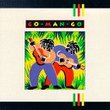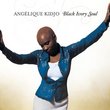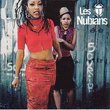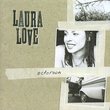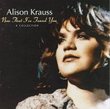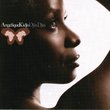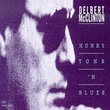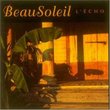| All Artists: Angelique Kidjo Title: Aye Members Wishing: 0 Total Copies: 0 Label: Fontana Island Original Release Date: 3/8/1994 Release Date: 3/8/1994 Genres: Dance & Electronic, International Music, Jazz, Pop Styles: Africa, Dance Pop Number of Discs: 1 SwapaCD Credits: 1 UPCs: 016253993426, 0731451843228, 016253993440, 731451843228, 738476545229 |
Search - Angelique Kidjo :: Aye
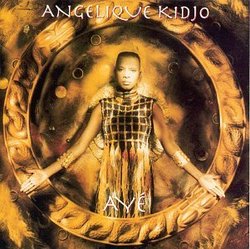 | Angelique Kidjo Aye Genres: Dance & Electronic, International Music, Jazz, Pop
Angélique Kidjo's high-powered soprano and stage charisma have carried the diminutive singer far from her native country of Bénin. She recorded her first solo album in Paris, her second in Miami, and her new one,... more » |
Larger Image |
CD DetailsSynopsis
Amazon.com Angélique Kidjo's high-powered soprano and stage charisma have carried the diminutive singer far from her native country of Bénin. She recorded her first solo album in Paris, her second in Miami, and her new one, Ayé in London with Soul II Soul's Will Mowat as one producer and in Minneapolis with Prince sidekick David Z. as the other. Kidjo sings in Fon and Yoruba (West African languages), but both producers as well as her cowriter Jean Hébrail reinforce her African rhythms with programmed drums and synths. The result is neither African music nor Anglo-American pop but a strange hybrid that contains some of the most exciting dance music anywhere today. African purists will be annoyed that Mowat and Z. have pushed Kidjo even further from her roots than before. American dance club denizens will be bothered that they can't understand what she's singing (the translations in the CD booklet for Ayé suggest they aren't missing much--mere platitudes about optimism, tolerance, the homeless, love and God). Americans may also be thrown by the skipping polyrhythms of Kidjo's music, so different from the fat, on-the-one funk they're used to. Yet it's Kidjo's ability to sing strong and hard (with a little sizzle in her timbre as the notes trail off) even as she skips effortlessly through the polyrhythms that makes her sound so fresh. Her triumph is not the breakthrough of real Sub-Saharan music but of a new international pop that marries West African beats to the technology of the Western dance record. --Geoffrey Himes Similar CDs
Similarly Requested CDs
|
CD Reviews"AYE" IS ANGELIQUE KIDJO'S SUPREME ACHIEVEMENT Possum-Bread | Pasadena, California | 12/02/2005 (5 out of 5 stars) "Angelique Kidjo's CD "Aye," in my humble opinion, is her greatest work. In it, she creates a bright Afro-pop sound that dominates the entire CD. The lead song "Agolo" is an upbeat, energetic dance number that is catchy. The video for "Agolo" was nominated for a Grammy Award. The harder-edged "Adouma" and the expansive, soaring "Djan-Djan" help mix things up, making "Aye" an adventurous listening experience. Here is some background on Angelique Kidjo: She was born, one of nine children, in the village of Ouidah in the little West African country of Benin. Her father is a musician, her mother a clothes merchant and director of a large dance troupe. Angelique began to sing and dance at the age of six. One of her older brothers introduced her at an early age to western rock, such as The Stones, Jimi Hendrix, James Brown and Aretha Franklin. She also was exposed to jazz, Arabic and Pakistani music in addition to church music. She began to sing in a band called Sphinx, which became popular and won several local competitions. In 1980 she moved to Paris and enrolled at music school, learning classical French songs and jazz. Thereafter she studied under the jazz singer Joy Kane for two years, something that had a strong influence on her later career and helped develop further her powerful and deep voice, as well as her rhythm and precision. In 1984 she participated in a tour with Radio France in West Africa. During this time she made several recordings in France and The Netherlands, before being discovered by Chris Blackwell of Island Records. If you enjoy World music or are just curious about it, "Aye" is a perfect choice. It's Afro-pop sound is infectious and has just enough of an American pop flavor to win over the most fickle listener. I wholeheartedly recommend it." One of my favorites Possum-Bread | 03/03/1999 (5 out of 5 stars) "Aye's tunes are instantly appealing and the polyrhythms both interesting and foot-snapping. I heard Angelique Kidjo at an aerobics class and went out the same day and bought all her CD's. I have lost count of the number of friends of mine who heard her music at my place and then went out and did the same! There is something about her voice and the spirit of her singing that never gets monotonous even if you listen to her every day - and I have only said this about Thelonious Monk's music - so its high praise indeed." A sure cure for boredom and bad days... S. Antonio Arch | Toronto & Grand Cayman | 05/09/2000 (4 out of 5 stars) "This album has the capacity to make a vast variety of people stop and listen to it; "Agolo" in particular is one of those rare pieces of contemporary music that can improve the atmosphere of many a situation and you might find yourself thinking of and trying to hum or shout the melody yourself.Translations are included in the notes, but even without knowledge of what Kidjo is singing about, the melodies, percussion and bass have been designed to endure and stand on their own and they do so beautifully."
|

 Track Listings (10) - Disc #1
Track Listings (10) - Disc #1